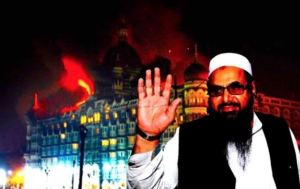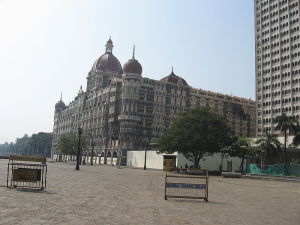nsnbc : After Pakistan, controversially, released Hafiz Saeed, the chief of the global terrorist organization Jamaat-ud-Dawa (JuD from house arrest, the Islamist cleric now seeks to be off the terror list.
 Hafiz Saeed has reportedly filed a petition with the United Nation, seeking removel of his name from the so-called terror list. He was placed under house arrest since January in Lahore, the capital of Pakistan’s most populous province of Punjab recently waked free on Friday, after a court in Pakistan ordered authorities to release him.
Hafiz Saeed has reportedly filed a petition with the United Nation, seeking removel of his name from the so-called terror list. He was placed under house arrest since January in Lahore, the capital of Pakistan’s most populous province of Punjab recently waked free on Friday, after a court in Pakistan ordered authorities to release him.
Saeed is now apparently seeking removal of his name from the list of designated terrorists on the ground that none of the allegations against him – either related to terrorism or otherwise – has been proved in the Pakistani courts. A Lahore-based law firm, Mirza and Mirza Law Associates is said to have filed the petition on behalf of Saeed in the UN.
Supreme Court Advocate Navid Rasul Mirza, the owner of this law firm confirmed on Tuesday that his law firm had recently filed the petition in the UN. According to reports, this is the first time that Saeed has hired a law firm other than that of his permanent counsel Advocate AK Dogar.
However, Mirza, who was the Additional Advocate General of Punjab Government (1993-1996) and Prosecutor General for the National Accountability Bureau, a government anti-graft body (2000-03), said in a statement:
“My law firm has filed the petition on Hafiz Saeed’s behalf at the UN seeking removal of his name from its list of designated terrorists. My son Haider Rasul who is director of this firm is looking after this case.”
A Jamaat-ud-Dawah office-bearer said that Saeed has decided to challenge the UN’s decision on the basis of different court decisions since 2009 in which no allegation – either related to terrorism or otherwise – has been proved in the Pakistani courts.
Saeed is under suspicion of being the mastermind or one of the masterminds of the Mumbai attack. Saeed, the alleged mastermind, was placed on the terrorism black list by the United Nations under UN Security Council Resolution 1267 in December 2008. Along with Saeed, LeT operations commander Zakiur Rehman Lakhvi was also placed on the terrorism black list.
Jamaat-ud-Dawah has argued that the UN’s decision to place Saeed’s name on the list of terrorists had caused harm to his reputation, claiming that it appeared that this had been done on international pressure. The JuD office-bearer reportedly added, “We have enough ground to fight our case in the UN. The UN should take up our petition and remove Hafiz Saeed’s name from the designated terrorists list.”
The United Nations Security Council (UNSC) has said on its website, “Saeed is prescribed for being associated with Lashkar-e-Taiba and Al-Qaeda for participating in the financing, planning, facilitating, preparing or perpetrating of acts of activities by, in conjunction with, under the name of, on behalf or in support of both entities.” The U.S. has declared JuD a global terrorist organization, condemning it as a front for the outlawed Pakistani Lashkar-e-Taiba (LeT) group.
The United States has also accused Saeed of plotting the 2008 attacks on India’s financial capital of Mumbai, in which ten LeT militants killed 166 people and wounded hundreds in Mumbai in November 2008. Nine of the attackers were killed by police while lone survivor Ajmal Kasab was caught. Kasab was executed after a court found him guilty and handed down death sentence. However, in video-recorded confessions he described how the attack was micromanaged from Pakistan even as the attack and firefights were in progress.
Washington has also offered a $10 million reward for information leading to Saeed’s arrest and conviction. Despite U.S. sanctions on Saeed, the cleric has been living freely in Pakistan and delivering anti-U.S. speeches. Saeed’s actions have been a major irritant in Pakistan’s traditionally uneasy relations with the U.S. and a major source of sustained tensions with India. The Indian government has linked resumption of normal ties with Islamabad to putting Saeed on trial for planning the Mumbai bloodshed.
However, Pakistani officials maintain India has not shared evidence to substantiate the charges. Indian government officials, for their part, blasted Pakistan for he decision to release Saeed, saying that it showed how Pakistan is “hoodwinking” the international community on the issue of terrorism. Officials in India also stated that the move is reflective of Islamabad’s “duplicity” in tackling terrorism and asked Pakistan to “walk the talk” on its assurances to the international community over dismantling terror infrastructure and not allowing its soil to be used for terror acts.
Following his release on Friday, Saeed said the U.S., on India’s request, pressured Pakistan to detain him. He said, “I was detained on the pressure of the U.S. on the Pakistani government. The U.S. did so on the request of India.”
F/AK – nsnbc 29.11.2017
Source Article from https://nsnbc.me/2017/11/29/newly-released-jamaat-ud-dawa-chief-hafiz-saeed-wants-to-be-romoved-from-terror-list/
Related posts:
Views: 0
 RSS Feed
RSS Feed
















 December 2nd, 2017
December 2nd, 2017  Awake Goy
Awake Goy 











 Posted in
Posted in  Tags:
Tags: 
















